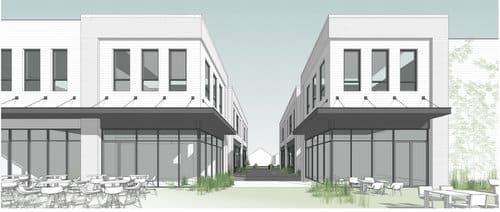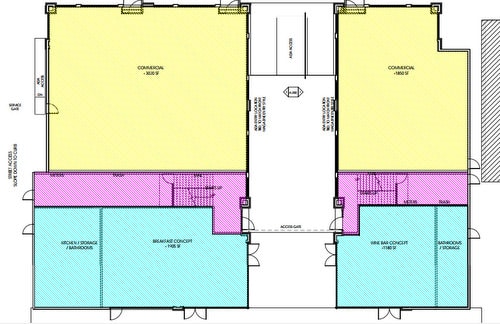
A rendering by Bell Architecture of the Framework building exterior on Magazine Street showing the central arcade leading to the courtyard in the rear. (via city of New Orleans)
The “Framework” commercial development on Magazine Street in the Lower Garden District — which will feature a bar from the owners of Tujaque’s — has been postponed by a month in the approval process while the owners work out a handful of design issues raised by city planners.
Patrick Schindler of Felicity Property Company and Mark Latter of Tujaque’s introduced the concept for the building at 1320 Magazine Street to Lower Garden District neighbors in March. It will consist of two two-story buildings separated by a central European-style pedestrian arcade in the center leading to a courtyard in the rear, and each building will have its own front and rear commercial suites, with flexible office space on the second floor.

The site plan for the Framework building by Bell Architecture shows the central courtyard, plus front and back commercial spaces. (via city of New Orleans)
Latter’s as-yet-unnamed bar will occupy one of the courtyard suites in the rear, and the development requires a conditional-use permit from the city in order to include it. In their initial report, the city planning staff recommended approval of the project, as long as it complied with 14 provisos.
“The bar use is sensitive and compatible with its commercial, industrial, and residential surroundings,” city planners wrote.
Schindler, however, appeared before the Planning Commission on May 8 with requests to alter four of those provisos.
- The building was designed with a two-foot setback to keep the steps into the building from impeding onto the sidewalk, but city planners recommended eliminating it. Schindler the alternative was a deeper entrance vestibule, which the Historic District Landmarks Commission discouraged because it might encourage homeless people to camp there.
- City planners are recommending 7-foot opaque fences to hide the trash areas, but Schindler said the building is designed with exterior niches to hide them already. Adding fences makes them more difficult to use, Schindler said.
- The city’s Comprehensive Zoning Ordinance requires all outdoor seating areas — such as the building’s courtyards — to have permeable paving, but Schindler said they are designed with a slope into a drain in order as part of the building’s overall stormwater management system. Staffers said the permeable paving could still be incorporated, because the building is new construction.
- Finally, the city required four short-term bicycle parking spaces for public use and one “long-term” covered bike space for use by an employee. Schindler said he is actually incorporating a three dual spaces that can accomodate six bikes, and asked for that to suffice instead of finding a new location for the separate long-term space.

A rendering of the profile of the Framework buildings within the other structures on the block. (via city of New Orleans)
Each of Schindler’s requests prompted a short discussion between the City Planning Commission members and the staff about whether a variance could be granted. City codes require variances granted by the City Planning Commission to meet nine criteria, and those have not been evaluated in these instances, the staff members said.
Schindler said he would be happy to review the issues with city staff that can be solved by discussion, but asked that the City Planning Commission go ahead and vote on the project to keep it moving forward on its construction schedule.
“A month is a meaningful amount of time for us,” Schindler said.
In order to do that, the commission members said, they would have to evaluate those nine criteria for each request on the spot. By meeting with the staff instead, he might be able to resolve some of the issues without needing a variance, they said.
“You haven’t had a chance to make a presentation on why you met those criteria,” said Commissioner Robert Steeg. “It really could be time well spent.”
Schindler said the month delay seemed like the quickest path to resolution. With that, the commissioners voted unanimously to defer the motion until the first meeting of the next month, June 12.